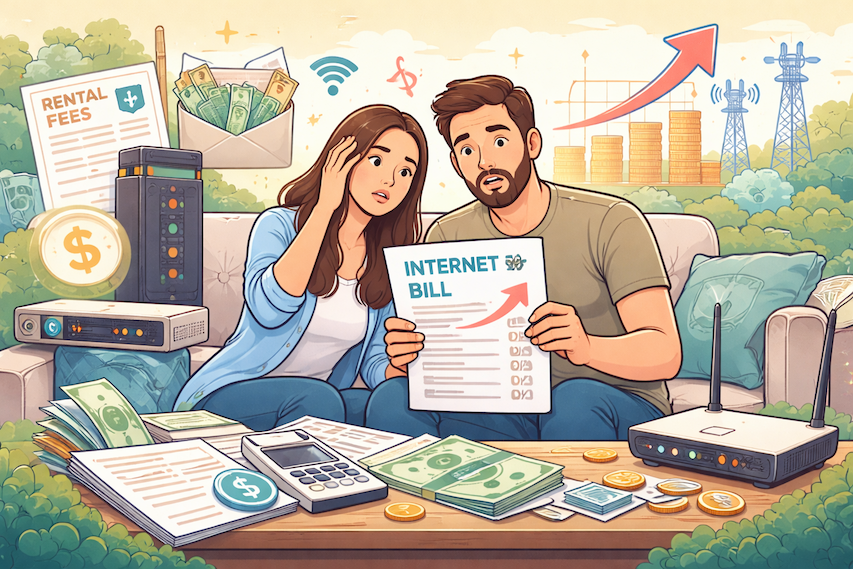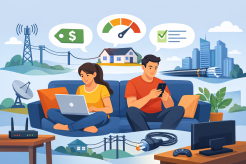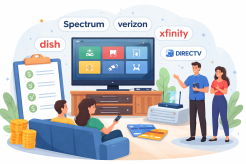Why Internet Bills Keep Going Up (And Why It Feels Constant)

If your internet bill seems to creep up every few months, you are not imagining it. Broadband pricing has become one of those quiet household expenses that rises slowly enough to avoid attention, until the total suddenly feels unreasonable.
Unlike electricity or water, broadband pricing in the United States is largely unregulated. Internet service providers have broad authority to set prices, introduce new charges, and adjust fees whenever they choose. While regulatory conversations have surfaced over the years, the reality is that rising internet costs are driven far more by market structure than policy changes.
What makes this especially frustrating is that most increases do not arrive as dramatic jumps. They appear as small monthly changes, renamed surcharges, or additional fees that blend into your bill. Over time, those additions add up.
Slower Growth Changed Pricing Strategies
In the early years of broadband, fast internet was viewed as a luxury. Providers competed aggressively, offering discounts and promotions to capture new customers. Growth was rapid, and expanding subscriber bases allowed companies to keep rates lower.
Today, broadband access is a necessity. Nearly every household that wants internet already has it. As growth slows, providers shift focus from acquiring customers to increasing revenue from existing ones. That shift explains why pricing rises even when service quality remains the same.
With fewer new users entering the market, higher monthly charges become the primary path to profit.
Limited Competition Keeps Rates High
In many areas of the country, households have access to only one wired internet provider. Even where two providers exist, pricing often moves in parallel rather than competitively.
When consumers lack meaningful choice, providers face little pressure to keep rates low. Price increases become routine, and customers often stay simply because switching is not an option.
This lack of competition is one of the most consistent drivers of long-term broadband inflation.
Miscellaneous Fees Quietly Inflate Bills
One of the most common reasons internet bills increase without warning is the steady growth of miscellaneous fees. These charges are often buried deep in monthly statements and described in vague terms.
Cable and broadband bills may include regional sports fees, broadcast television fees, or infrastructure-related charges. Other line items stem from federal obligations tied to expanding service in rural and low-income areas. While each fee seems minor, they add up quickly.
Estimates suggest that these extra charges can add 20 to 40 percent to the base cost of a broadband plan. Because they increase gradually, most customers do not notice until the total jumps noticeably.
Regularly reviewing your bill is often the only way to track these changes.
Equipment Rentals Add Ongoing Costs
Internet providers do not include modems or routers out of generosity. These devices are rented to customers and appear on bills as monthly equipment charges.
In some cases, customers continue paying these fees even after returning provider equipment or using their own devices. While billing errors may be unintentional, they are surprisingly common and rarely corrected automatically.
Over time, equipment rentals can cost far more than purchasing your own modem outright, quietly increasing the lifetime cost of your internet service.
Installation Fees Appear More Often Than Expected
Some providers add installation charges even when no physical work is required. These fees may appear on the first bill regardless of whether a technician visited the home.
This practice is especially common when switching providers. A closer look at ISP installation charges shows how often these costs appear despite minimal setup requirements. These fees may be higher each time a customer changes service.
Watching for installation charges early can prevent unnecessary surprises.
ISPs Known for Frequent Price Increases
Certain providers have developed reputations for regularly adjusting pricing through surcharges, rental increases, and plan restructuring.
Customers using XFINITY service have seen price hikes on standalone internet plans as well as higher modem rental fees. In some markets, basic internet-only plans have increased significantly, while bundled packages see steady monthly additions.
Subscribers on Frontier plans may notice stable advertised rates paired with new infrastructure surcharges. These charges raise the total bill without altering the stated plan price.
Meanwhile, Cox pricing has shifted through higher base rates and the introduction of data caps. Customers who once had unlimited access were moved to capped plans, with an added charge required to restore unlimited usage.
Across providers, the pattern remains consistent: higher revenue through incremental changes.
Government Oversight Remains Limited
Despite public debate, federal regulation of broadband pricing remains unlikely. Many consumers associate price increases with regulatory changes, but historical evidence suggests otherwise.
The removal of Net Neutrality did not lead to lower prices, just as its presence did not prevent increases. Internet bills continued rising in both periods, indicating that pricing is driven more by market control than regulation.
While state-level scrutiny has increased in some areas, broad federal intervention appears improbable in the near future.
Competition May Be the Only Real Fix
Only about one in five Americans has access to more than one wired broadband provider. That limited access gives ISPs significant control over pricing.
Emerging alternatives may eventually change this. Wireless and satellite services continue to improve, offering new options where wired competition is limited. Fixed wireless and 5G home internet show particular promise.
More competition would directly benefit consumers by restoring pricing pressure.
Why Price Hikes Feel Inevitable
The reality is that nearly all major providers raise prices whenever market conditions allow. Fees, rentals, and plan adjustments are built into long-term pricing strategies.
Until broadband is treated more like a public utility, consumers remain responsible for monitoring their bills and responding when costs rise beyond reasonable value.
Comparing providers regularly remains one of the most effective ways to manage costs. Reviewing internet deals across multiple companies often reveals options that are significantly cheaper than existing plans.
Final Thoughts
Internet price increases rarely come from a single source. They are the result of slowed growth, limited competition, hidden fees, equipment rentals, and evolving pricing strategies.
While regulatory changes may help in the future, meaningful competition remains the strongest force for price stability. Until then, staying informed is essential.
Monitoring your bill, questioning unexplained charges, and remaining willing to switch providers are the most effective tools available to consumers today.
Related Posts
 Technology
Technology
Faster Browsing: Essential Keyboard Shortcuts Guide
Boost browsing speed with essential keyboard shortcuts for all major web browsers. Learn faster navigation, tab control, and productivity tips.
 Technology
Safety
Technology
Safety
How Gamers Can Stay Safe From Online Cyber Threats
Learn how gamers can protect accounts, devices, and personal data from cyber threats including phishing, malware, scams, and identity theft while gaming online.
 Technology
Technology
Best Free Movie Streaming Sites to Watch in 2026
Discover the best free movie streaming sites. Watch movies, live TV, anime, and documentaries legally with no subscription required.
 Internet Bundles
Internet Bundles
Finding Reliable Internet Without Overpaying
Compare the best internet providers near you. Learn how to choose reliable, affordable internet based on speed, price, availability, and real-w
 Internet Bundles
Broadband Deals
Internet Bundles
Broadband Deals
Cheapest TV Packages and Providers Compared 2026
Compare the cheapest TV packages from top providers in 2026. See channel counts, pricing, and bundle options to find the most affordable TV service for your home.